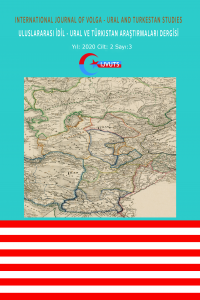Türkmen Mutasavvıf Şâir Azadî'nin (ö. 1173/ 1760) Şiirlerinde "Nefs" Kavramı
Tasavvuf, Döwletmemmet Azadî, Nefs, 18.yüzyıl
The Concept of "Nefs" in the Poems of Turkmen Sufi Poet Azadi (d. 1173/ 1760)
Sufism Nefs, Türkmenistan, 18th century, Döwletmemmet Azadi,
___
- Altuntaş, H. Ve Şahin, M. (2015). Kur’ân-ı Kerîm Meâli. TDV Yayınları: Ankara
- Arslan, A. (1980). Risâle-i Kuşeyrî. Arslan Yayınları: İstanbul
- Biray, H. (1992). Mahtumkulu Dîvânı. Kültür Bakanlığı Yayınları: Ankara
- Bulut, H. (2020). Tasavvufî Bir Bakış Açısıyla Nefs. Malatya İnönü Üniversitesi Mesned İlahiyat Araştırmaları Dergisi, C: 11(1), s. 165-188.
- Cebecioğlu, E. (2004). Tasavvuf Terimleri ve Deyimleri Sözlüğü. Anka Yayınları: İstanbul
- Coşan, M.E. (2016). Tabakâtü’s-Sûfiyye Sohbetleri. (Haz. Metin Erkaya), Bilge Yayınevi: Ankara
- Cürcânî, A. (1997). Mu’cemü’t-Ta’rîfât. (Çev.: Arif Erkan), Bahar Yayınları: İstanbul
- Dinç, A. Ve Çakır, R. (2008). Türkmen Kültürü ve Türkmenlerin Sosyo-İktisadi Düşüncesi. Ayrıkotu Yayınları: İstanbul
- Erginli, Z. (2006). Metinlerle Tasavvuf Terimleri Sözlüğü. Kalem Yayınları: İstanbul Erzurûmî, İ. Mârifetnâme. (1993). (Sad.: Durali Yılmaz, Hüsnü Kılıç), Devran Yayıncılık: İstanbul
- Feyizli, H. (2008). Feyzü’l- Furkan Açıklamalı Kur’ân-ı Kerim Meali. Server İletişim: İstanbul
- Hücvîrî, E. (2020). el- Keşfü’l-mahcûb (Hakikat Bilgisi). (Haz.: Süleyman Uludağ), Dergâh Yayınları: İstanbul
- Gazzâlî, E. (1975). İhyâ’ü ‘ulûmi’d-dîn. (Çev.: Ahmed Serdaroğlu), Bedir Yayıncılık: İstanbul
- Godarow, R. (2012). Döwletmammet Azady Eserler. Uludağ Üniversitesi Basımevi: Bursa
- Isfahânî, R. (2010). Müfredat/ Kur’ân Kavramları Sözlüğü. (Çev.: Abdulbaki Güneş, Mehmet Yolcu), Çıra Yayınları: İstanbul
- Kara, M. (2002). Hazar Ötesi Türkmenleri ve Türkmenistan. Ankara Türk Dünyası Dil ve Edebiyat Dergisi, Sayı: 14, s. 235-252.
- Kasımov, B. (2002). “Azadî”. Türk Dünyası Ortak Edebiyatı Türk Dünyası Edebiyatçılar Ansiklopedisi. Cilt: 2, s. 95-96. Atatürk Kültür Merkezi Yayınları: Ankara
- Kâşânî, A. (2015). Letâifu’l-a’lam fî İşarâtı Ehli’l-ilhâm / Tasavvuf Sözlüğü. (Çev.: Ekrem Demirli), İz Yayıncılık: İstanbul
- Kazvînî, E. (2012). el- Sünen-i İbn-i Mâce Tercemesi ve Şerhi. (Çev.: Haydar Hatipoğlu), Kahraman Yayınları: İstanbul
- Kurt, H. (2012). “Türkmenistan”. Türkiye Diyanet Vakfı İslam Ansiklopedisi. C. 41, s. 599- 601. TDV Yayınları: İstanbul
- Kuşeyrî, E. (2001). er-Risâletü’l-Kuşeyriyye. (Thk.: Halil el-Mansûr), Daru’l-Kütübi’l- İlmiyye: Beyrut
- Mekkî, E. el- Kûtu’l-Kulûb. (2003) (Çev.: Yakup Çiçek, Dilaver Selvi), Semerkand Yayınları: İstanbul
- Mervezî, E. (2005). el-Müsned el-Fethu’r-Rabbani Tertibi. (Çev.: Rıfat Oral), Ensar Yayıncılık: İstanbul Mevlânâ, C. (2007). Mesnevî-i Şerif. (Çev.: Veled İzbudak), Doğan Kitap: İstanbul
- Nesâî, E. (2007). en- Sünen-i Nesâî. (Çev.: Abdullah Parlıyan), Konya Kitapçılık: Konya Özköse, K. (2016). Nefsin Mertebeleri. Malatya Somuncu Baba İlim Kültür ve Edebiyat Dergisi, Sayı: 183, s. 24-38.
- Sağlam, S. (2011). Azadî (Hayatı- Edebî Şahsiyeti- Eserleri). Doktora Tezi Ege Üniversitesi, Sosyal Bilimler Enstitüsü, İzmir
- Sağlam, S. (2013). “Azadî”. Türk Edebiyatı İsimler Sözlüğü. Ahmet Yesevi Üniversitesi: Kazakistan-Türkistan
- Sağlam, S. (2014). Mahtumkulu’nun Edebî Şahsiyetinin Oluşumunda Babası Dövletmemmet Azadî’nin Etkisi. Bursa Uluslararası Türkçe Edebiyat Kültür Eğitim Dergisi, Sayı: 2, s.128-153.
- Saray, M. (2012). “Türkmenistan”. Türkiye Diyanet Vakfı İslam Ansiklopedisi. C. 41, s. 601- 605. TDV Yayınları: İstanbul
- Semerkandi, E. (2004). es- Sünen-i Dârimi Tercüme ve Şerhi. (Çev.: Abdullah Aydınlı), Madve Yayınları: İstanbul
- Uludağ, S. (2006). “Nefis”. Türkiye Diyanet Vakfı İslam Ansiklopedisi. C. 32, s. 529-531. TDV Yayınları: İstanbul
- Uludağ, S. (1991). Tasavvuf Terimleri Sözlüğü. Marifet Yayınları: İstanbul
- Yılmaz, H.K. (1999). Bir Lokma Bir Hırka. İstanbul Altınoluk Dergisi, Sayı: 157, s. 5-10.
- Yılmaz, H.K. (2009). Cihâd-ı Ekber En Büyük Cenk. İstanbul Altınoluk Dergisi, Sayı: 285, s. 8-13.
- Yılmaz, S. (2011). Mesnevî’de Geçen Hayvan Metoforlarının Tasavvufî Yorumu. Yüksek Lisans Tezi, Konya: Selçuk Üniversitesi, Sosyal Bilimler Enstitüsü.
- Yüce, A. (2005). el-Muhâsibî er-ri’aye Kalp Hayatı. Işık Yayınları: İstanbul.
- ISSN: 2687-3095
- Başlangıç: 2019
- Yayıncı: Gökçe Yükselen PELER
Kırgız Türkçesinin Ağızlarında Sebze Adları Üzerine Bir İnceleme
Türkmen Mutasavvıf Şâir Azadî'nin (ö. 1173/ 1760) Şiirlerinde "Nefs" Kavramı
Çağrı PİŞKİN, Alper Volkan ERTEM
Nurettin HATUNOĞLU, Tahir AŞİROV
Recurrent Proverbs in Dîvânu Lugâti't-Türk, by Emrah Bozok, Published in 2021, at Gazi Kitabevi
Tipolojik Olarak İki Farklı Dil Tarafından Paylaşılan Bir Görünüş İşaretleme Yapısı
